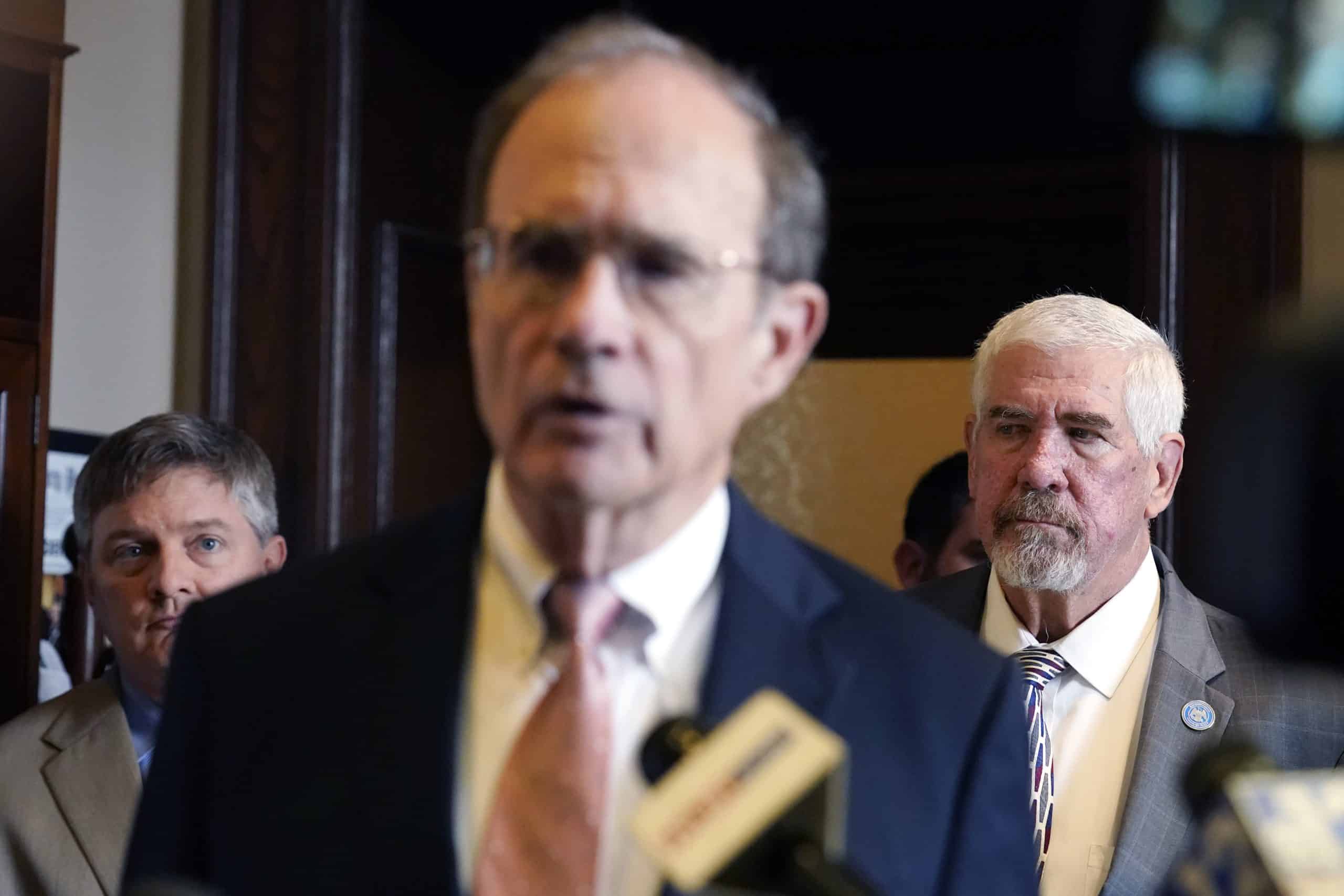Mississippi Today
Where’s the plan? Senate still has only ‘dummy bill’ for Medicaid expansion

Facing a Thursday deadline for passage, the state Senate leadership has refused to detail its Medicaid expansion plan, leaving members in the dark and health experts worried the plan could ultimately include elements that are unfeasible, costly and counterproductive.
Two-and-a-half months into the legislative session, and after 10 years of debate, Senate Medicaid Chairman Kevin Blackwell told Mississippi Today on Monday afternoon that there was no update on a Senate proposal to expand Medicaid eligibility to the working poor and said, “we're still working on it.”
Two weeks after the House overwhelmingly passed a bill to expand Medicaid, the Senate has not brought the House measure up, even in committee, and Senate leaders refuse to comment on it.
The Senate expansion bill, which only has the necessary code sections to expand Medicaid with no details, passed committee the first week of March. But trying to have the full Senate pass such a “dummy bill” could prove counterproductive, with senators on the fence unlikely to support a bill they know nothing about.
Blackwell declined to elaborate whether he would advance the dummy bill for a floor vote, if he would let it die or if he planned to propose a substantive expansion plan before the Thursday deadline.
“You'll just have to wait and see,” he said on Monday.
READ MORE: Gov. Tate Reeves privately tells senators he will veto any Medicaid expansion bill
The only detail Blackwell and Lt. Gov. Delbert Hosemann have confirmed about the plan is that it would contain a work requirement for new coverage recipients — a prerequisite which could kill the effort to expand the health program if the feds don't approve it.
Members of the Senate have voiced concerns about supporting a skeletal bill without knowing what it might eventually contain.
Sens. Scott DeLano, R-Biloxi, and Daniel Sparks, R-Belmont, say they have never favored expansion, but not having a real bill in front of them doesn't help the cause. If they were presented a real bill, they say, they would consider the policy.
“I've always been pragmatic. If you show me there's a sustainable way to do something, I will listen,” DeLano said. “I am a compassionate person as well. I want to help people as much as we can. But show me where the sustainable funding will come from … I haven't seen a bill. If you want me to support something — I haven't seen a bill, we haven't seen a bill yet.”
Sparks echoed the sentiment.
“I have not seen the language of the Senate Medicaid expansion plan,” Sparks said. “As I do with all legislation, though, I will review it, study it and ask questions about it.”
The only detail Blackwell has made public is that the bill would need to contain a work requirement, meaning enrollees would need to prove employment or exemption in order to be covered. That requires approval from federal Centers for Medicaid Services, which under the Biden administration has rescinded work requirements previously approved for other states during the Trump administration and has not approved new ones. Georgia remains in litigation with the federal government over the work requirement issue, and has suffered low enrollment and missed out on millions in federal funds by not expanding fully.
Even if a work requirement were approved, it would be costly to implement and could cause a host of administrative difficulties, resulting in loss of coverage even for employed individuals. To the extent that work requirements lead to lower-than-expected enrollment, certain economic benefits of expansion such as additional tax revenue would be muted, according to a March 2024 study conducted by The Hilltop Institute at the University of Maryland, Baltimore County.
Hilltop previously conducted a more comprehensive report on Medicaid expansion in Mississippi, which it presented to the House Medicaid committee in mid-February. During the panel, the researchers outlined how it would boost the economy, generate thousands of jobs and help struggling hospitals.
The work requirement study estimates that if Medicaid were expanded in Mississippi, the majority of enrollees would be either employed or exempt from employment due to disability or extenuating circumstances.
Under the Arkansas Works program, the state saw 45% of new enrollees were employed. Of those unemployed, over 75% were exempt, and only a small number were unemployed and not eligible for exemption.
Arkansas briefly had a Medicaid work requirement from 2018-2019. Research shows it did not lead to more people entering the workforce.
Furthermore, explained Morgan Henderson, Hilltop's principal data scientist, the cost and administrative chore of implementing work requirements far exceeds the cost of insuring a small number of unemployed, non-exempt individuals along with the rest of the employed or exempt population.
“It would be very challenging to have a robust Medicaid expansion program with a work requirement,” Henderson said.
That's because implementing work requirements would involve enrollees submitting proof of employment monthly. It would require more staff, and would “introduce substantial confusion among enrollees,” according to the study, which could mean that “if working individuals do not realize that they must report their work status, working enrollees may also lose coverage.”
And others might not even apply.
“There's a lot of research to show that even seemingly very small paperwork barriers can prevent folks from signing up for health insurance,” Henderson said, “even very affordable health insurance, and so it will reduce uptake – work requirements – we know this for a fact.”
Georgia, the only state currently trying to implement work requirements, has a very low uptake. Georgia's Department of Community Health had estimated the state would see 64,000 new enrollees from expansion, but as of Dec. 15, 2023, only 2,344 individuals were actively enrolled.
“Some people don't have internet access,” Henderson explained, “some people just don't complete the requirements for whatever reason, and so there are folks who are legitimately employed, who should be income-eligible, who would certainly be frozen out just because of the administrative confusion.”
Eligible enrollees who were deemed ineligible due to procedural errors would have to reapply, causing an even greater strain on a system that is already understaffed and backlogged. That's due in part due to “unwinding,” the process in which state Medicaid divisions across the country have been reviewing their rolls for the first time in three years after the end of COVID-19 restrictions that prevented them from kicking people off.
“In this era of PHE unwinding, it would be extremely cumbersome, I think, to actually implement this work requirement in Mississippi,” Henderson said.
Per a 2019 GAO report, the administrative costs of implementing work requirements range from $6.1 million in New Hampshire to $271.6 million in Kentucky.
In addition to that, if CMS does not consider the Mississippi plan to be Medicaid expansion under the Affordable Care Act — as is the case with Georgia — the state would only receive its traditional share of federal funds for its program, instead of the increased incentive of 90% for states that expand. Georgia is only receiving 65.9% federal share under its “Georgia Pathways to Coverage,” missing out on the millions more of federal funds it would receive under true expansion.
The Mississippi House expansion bill, which passed 98-20 without discussion and now sits untouched in the Senate, calls for a work requirement but says the state's Medicaid program will be expanded regardless of whether the federal government approves the requirement.
The Senate would have to pass its expansion bill Thursday — whether it's a skeletal bill or full-fledged bill — to keep it alive.
If the bill dies or is not passed, the Senate could still take up the House bill.
This article first appeared on Mississippi Today and is republished here under a Creative Commons license.
Did you miss our previous article…
https://www.biloxinewsevents.com/?p=340053
Mississippi Today
On this day in 1892
MAY 21, 1892

Crusading journalist Ida B. Wells published a column exposing the lynchings of African-American men and denouncing claims that the lynchings were meant to protect white women.
Her anti-lynching campaign came after a mob killed three of her friends, who had reportedly opened a grocery store that competed with a white-owned store in Memphis.
Upset by Wells' writings, a white mob destroyed her presses and threatened to kill her if she ever published again. She left Memphis for Chicago, but she continued to expose lynchings, calling for national legislation to make lynching a crime.
In 1898, she took her protest to the White House.
“Nowhere in the civilized world save the United States of America do men, possessing all civil and political power, go out in bands of 50 and 5,000 to hunt down, shoot, hang or burn to death a single individual, unarmed and absolutely powerless,” she wrote. “We refuse to believe this country, so powerful to defend its citizens abroad, is unable to protect its citizens at home.”
The National Memorial for Peace and Justice in Montgomery, which opened in 2018, features a reflection space in honor of her.
Congress finally passed an anti-lyncing law in the 2021-22 session. The Emmett Till Antilynching Act defines lynching as a federal hate crime.
This article first appeared on Mississippi Today and is republished here under a Creative Commons license.
Mississippi Today
On this day in 1961
MAY 20, 1961

A white mob of more than 300, including Klansmen, attacked Freedom Riders at the Greyhound Bus Station in Montgomery, Alabama. Future Congressman John Lewis was among them.
“An angry mob came out of nowhere, hundreds of people, with bricks and balls, chains,” Lewis recalled.
After beating on the riders, the mob turned on reporters and then Justice Department official John Seigenthaler, who was beaten unconscious and left in the street after helping two riders.
“Then they turned on my colleagues and started beating us and beat us so severely, we were left bloodied and unconscious in the streets of Montgomery,” Lewis recalled.
As the mob headed his way, Freedom Rider James Zwerg said he asked for God to be with him, and “I felt absolutely surrounded by love. I knew that whether I lived or died, I was going to be OK.”
The mob beat him so badly that his suit was soaked in blood.
“There was nothing particularly heroic in what I did,” he said. “If you want to talk about heroism, consider the Black man who probably saved my life. This man in coveralls, just off of work, happened to walk by as my beating was going on and said ‘Stop beating that kid. If you want to beat someone, beat me.' And they did. He was still unconscious when I left the hospital.”
To quell the violence, Attorney General Robert Kennedy sent in 450 federal marshals.
This article first appeared on Mississippi Today and is republished here under a Creative Commons license.
Mississippi Today
Podcast: The controversial day that Robert Kennedy came to the University of Mississippi
Retired U.S. Bankruptcy Judge Edward Ellington talks with Mississippi Today's Bobby Harrison and Geoff Pender about former U.S. Attorney General Robert Kennedy's speech at the University of Mississippi less than four years after the riots that occurred after the integration of the school. Ellington, who at the time headed the Ole Miss Speaker's Bureau as a law school student, recalls the controversy leading up to the speech.
This article first appeared on Mississippi Today and is republished here under a Creative Commons license.
-
SuperTalk FM4 days ago
State auditor cracking down on Mississippians receiving unemployment benefits
-
Mississippi News Video6 days ago
Jackson has a gang problem
-
Local News4 days ago
Family files lawsuit after teen’s suicide in Harrison County Jail
-
Mississippi Today5 days ago
On this day in 1950
-
228Sports7 days ago
George County Pours Runs In 6A South State Title Victory At PRC
-
Local News Video6 days ago
In the Kitchen with J's Restaurant
-
Mississippi Business4 days ago
Connor Industries locating operations in Coahoma County
-
Our Mississippi Home3 days ago
Deer Fly Season on the Coast – Oh My!












































